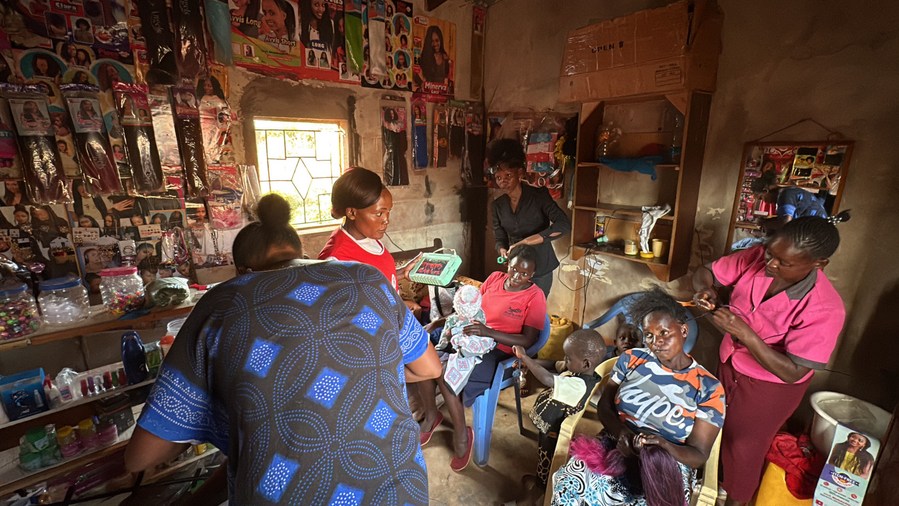
Local women participate in a hairdressing lesson delivered on a solar-powered tablet in a makeshift salon in Makueni, Kenya, June 6, 2024. (Photo by Lin Jing/Xinhua)
Designed to empower off-grid and marginalized rural communities in Kenya,solar-powered tablets provided by China’s Shenzhen Solar Run Energy Co. Ltd. have benefitted more than 200 families,through provision of hands-on vocational skills in such areas as agri-business, tailoring and hairdressing.
NAIROBI, June 17 (Xinhua) — In the serene and undulating plains of southeastern Kenyan county of Makueni, Christine Musyoki’s 10-acre farm stands out amid green foliage occasioned by recent heavy rains.
The mother of four, who is a trained teacher, proudly strolled the farm, pointing at the blooming lettuce, onions, nappier grass and maize that will be harvested soon for sale to markets in nearby towns.
Musyoki’s prowess in commercial farming is attributed to the lessons she learned from a solar-powered tablet provided by China’s Shenzhen Solar Run Energy Co. Ltd. in partnership with a local charity, Mama Layla Solar Lights.
Thanks to agronomy lessons pre-installedin the tablet,dubbed “Solar Media,” Musyoki has gained knowledge and skills in cultivating vegetables, onions, and legumes in her farm, located 78 kilometers southeast of Nairobi, the Kenyan capital.
“Since I started using ‘Solar Media,’ I must say, the harvest is bumper. I have learned so many skills from ‘Solar Media.’ I have learned about spacing, some spraying skills, use of chemicals and herbicides,” Musyoki told Xinhua during a recent interview at her farm.
Designed to empower off-grid and marginalized rural communities in Kenya through provision of hands-on vocational skillsin such areas as agri-business, tailoring and hairdressing, the solar-powered tablets were first rolled out in September 2022.
More than 200 families in remote corners of the country have benefitted from the implementation of the project, with 25 and 81unitshavingbeen distributed during the first and second phases respectively.
About 200 solar tablets were expected to be distributed countrywide in November 2023 during implementation of the project’s third phase, according to Solar Run Energy.
Musyoki is among rural farmers whose embrace of the gadgets has been transformative, providing them with easy-to-read information on tilling, planting, weeding, applying fertilizers, and irrigating their crops.
Jane Triza Akinyi, an agronomist with the Mama Layla charity, said the solar-powered tablets have pre-installed visual and written material to educate farmers on different crop varieties, spacing, farm equipment handling, and post-harvest management.
“‘Solar Media’ is very user-friendly. Farmers have accepted the knowledge it provides. The gadget aids with the learning process, how to dig holes, transplant the seedlings and different ways of doing irrigation,” Akinyi said.
Since its entry into the Kenyan market 15 years ago, Solar Run Energy has enhanced access to electricity among off-grid rural communities, transforming their lives, said Li Xia, the company’s founder.
According to Li, the rollout of “Solar Media” in partnership with local charities has empowered farmers, artisans, and small-business owners with life-long skills, improving their financial status.
“We have been empowering jobless people with vocational skills like hairdressing and tailoring. In addition, we have also improved farmers’ skills to help communities grow,” Li said.
She added that the “Solar Media” project has also helped communities address healthcare challenges, in addition to providing school children with content covering key subjects like mathematics and English.
During the World Economic Forum, held in Davos, Switzerland, early this year, Li Xia won an award from the Schwab Foundation, a recognition of her contribution over the last 15 years asa social entrepreneur to helping Africa’s off-grid populationsgain access to clean energy.
Nestled in the remote corners of Makueni county, Pauline Nthenge’s tailoring shop was a beehive of activity as a group of female students gathered for evening lessons on knitting dresses, delivered through the solar-powered tablet.
In 2023, Nthengetook a six-month tailoring course, paving the way for her to venture into dress-making while tutoring her peers for free, using the tablet.
“Thanks to ‘Solar Media,’ I have managed to open a tailoring business and teach my peers how to knit appealing clothes and earn them an extra income,” Nthengesaid inside her shop, illuminated by solar light tapped from the rooftop.
A few meters from Nthenge’s shop, Martina Mbeti, a mother of three, grinned as she participated in hairdressing lessons delivered from a solar-powered tablet that hung on the wall of a makeshift salon.
Mbeti, an elementary school teacher, was inspired by her peers to enroll for hairdressing lessons and broaden her revenue streams.
Rehema Mukuiis one of the earliest beneficiaries of the “Solar Media” project, which has lit her home while providing her with practical lessons on hairdressing, poultry farming, and baking cakes to improve her financial standing.
The busy path leading to Mukui’shomestead can be scary at night, but when the main house is lit using solar power tapped from panels installed at the rooftops, visitors find some respite.
Source: Xinhua News Agency
*This article is from Belt and Road Portal
